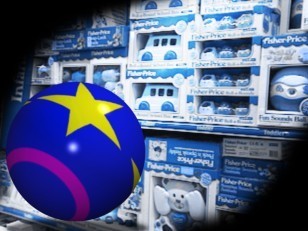Safe Kids Coordinator Kim Martin says while it may be too late for this Christmas, you can sign up for emails that will keep you up-to-date on recalls.
More than 65 percent of the toys bought in the United States are purchased between Thanksgiving and Christmas.
But with millions of toys being recalled because of dangerous lead paint and magnets, Martin says toy shoppers need to remember that that number is a small fraction of the overall number of toys -- approximately 3 billion -- sold in the United States every year.
"Shoppers need to be even more informed than usual to make sure they buy safe, age-appropriate toys, said Kim Martin, Safe Kids Gainesville/Hall County coordinator. "Even though most toys in the U.S. today are considered to be safe, it doesn't mean we should throw caution to the wind."
Each year, approximately 217,000 toy-related injuries are treated in hospital emergency rooms nationwide. But on average, only 15 children under the age of 14, dies from a toy-related injury.
To stay informed, Martin recommends that parents sign up for emails that will keep them up-to-date on recalls. "It's too difficult to get your information piecemeal from TV or the newspaper," said Martin, "so if you get the emails sent to you each time a recall happens, you'll be up-to-the-minute and won't have to worry."
To sign up for recall emails, go to www.cpsc.gov and click on Sign up for Email Announcements.
Parents and caregivers shouldn't hesitate to report defects or design features that seem dangerous.
"If your child has a close call, the next child might not be so lucky," says Martin. "Report safety concerns about toys to the Consumer Product Safety Commission at 800-638-2772 or www.cpsc.gov. Your experience could be part of a pattern that might lead to a recall."
Martin reminds parents that most toys are safe, especially if you buy from a reputable retailer. "That doesn't mean you have to go to a 'big box' store, but if you shop a locally-owned toy store, make sure that the owner is aware and vigilant about getting recalled items off the shelves. And avoid used toys, which could have been recalled and not removed from circulation."
"If you buy toys secondhand or get hand-me-downs, visit www.cpsc.gov to make sure the toy hasn't been recalled for safety reasons," says Martin. "If a new toy comes with a product registration card, mail it in right away so the manufacturer can contact you if the item is ever recalled."
Safe Kids Gainesville/Hall County also recommends these precautions:
*Make sure to buy age-appropriate toys. All toys are clearly marked if they have small parts; do not buy toys with small parts (or allow a child under age 3 to play with those kinds of toys belonging to an older sibling).
*Identify dangerous small parts. To be sure of a toy's size, use a small parts tester (available in quantity from the Safe Kids Resource Catalog). Do not let small children play with anything that can fit into one of these cylinders.
*Inspect toys to make sure they are in good repair. Do not let young children play with toys that have straps, cords or strings longer than 7 inches, due to the risk of strangulation.
*Actively supervise children. Caregivers should actively supervise children playing with any toy that has small parts, moving parts, electrical or battery power, cords, wheels or any other potentially risky component. Simply being in the same room as your child is not necessarily supervising. Active supervision means keeping the child in sight and in reach and paying undivided attention.
*Practice proper storage. Teach children to put toys away after playing, to help prevent falls and unsupervised play, and make sure toys intended for younger children are stored separately from those for older children. Toy chests should be equipped or retrofitted with safety hinges that prevent the lid from closing on a child who is leaning over the open chest; if a chest does not have safety hinges, remove the lid.
On the Net: Safe Kids. http://www.safekidsgainesvillehall.org
Consumer Product Safety Commission. http://www.cpsc.gov

Toys
http://accesswdun.com/article/2007/12/205168
